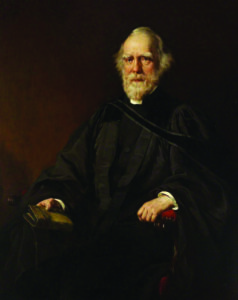
By James Morison
What Faith Is Not
Believing is not a kind of feeling. Neither is it a kind of willing. It is a kind of thinking.
“The understanding,” as James Fraser of Brea expressed it, in his Treatise Concerning Justifying Saving Faith, written by him while “a prisoner for Christ in the Bass Rock,” “is the proper and immediate subject of ‘faith’” (Vol. I, p. 175).
When we believe that there is a God, we do not feel that there is. Neither do we will that there shall be. We think that there is. And we think that there is, because we have reason for entertaining such a thought.
When we believe that there is a land called Australia, we do not feel that there is. And we do not choose that there shall be. We think that there is and we think that there is, because we have evidence to satisfy us that there is such a country.
When we believe that Abraham was the father of the Israelites, we do not feel that he was. We do not will or choose that he should be. We think that he was. And we think that he was, because we have evidence to satisfy us that he was.
When we take money to the bank and lodge it for a period, we have faith that we shall get interest for it, and that we shall get it back whenever we may wish to have it. We believe that we shall get interest. And we believe that we can get back the entire sum.
What is this believing or faith? It is, assuredly, neither feeling nor willing. We do not feel that we shall get interest. And though we choose or will to get it, yet our choice or will is founded on our believing or faith, and is thus not the believing or faith itself. When we believe that we shall get interest—and both interest and capital as soon as we wish to have both—we just think that we shall get interest, and our capital, too. And we have this thought because we have evidence that satisfies us that the bank is worthy of being trusted—of being entrusted with our money. The bank’s credit is good with us. The bank commands credit in the money market.
Faith Is Persuasion
Believing then, is a kind of thinking, though not the same kind of thinking as that by which we demonstrate a mathematical proposition, or that by which we observe the facts of science, or that by which we weave a web of imagination. It is that kind of thinking which is founded upon evidence. It is a persuasion of the mind.
It is assuredly of great moment that men should bear in mind that, when they are called upon to believe in the Lord Jesus Christ for salvation, it is thinking that is needed. It is our thoughts of things that ultimately rule us. It is thought that rules the world.
If, then, men would believe in God, they must think, and think the right thought about God.
___________________
James Morison (1816-1893) was a Scottish theologian. This is an exerpt from his book Saving Faith (London: Hamilton, Adams, & Co., 1871), pp. 22-25.
